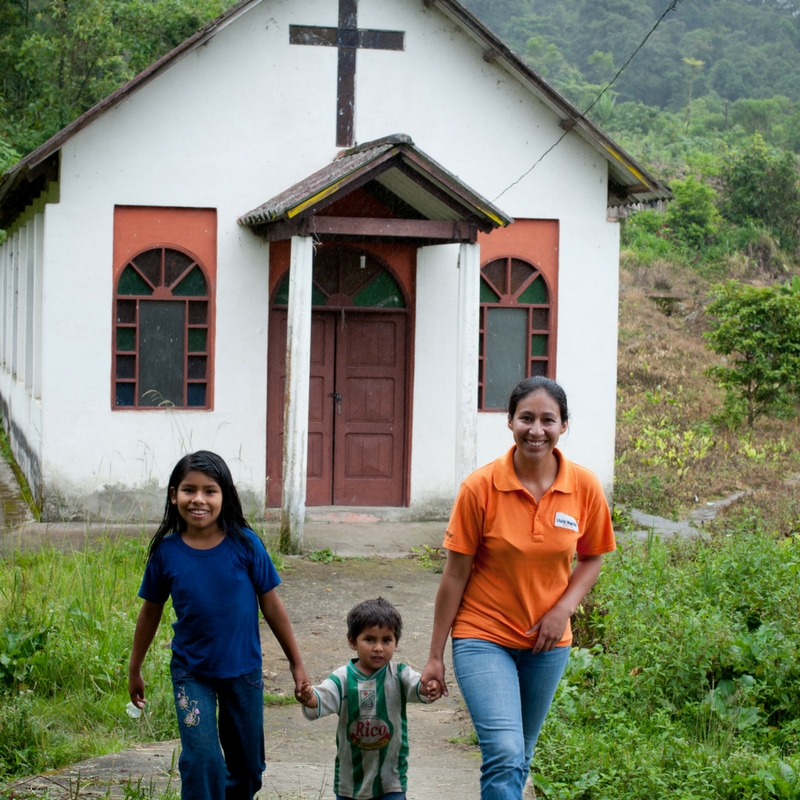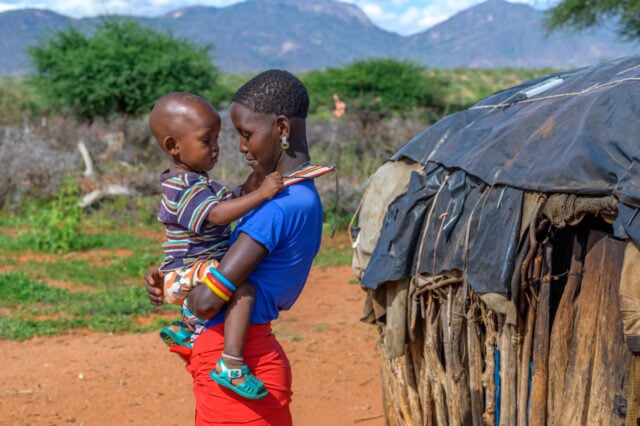In today’s Q&A, World Vision program management specialist Erica Stetz discusses World Vision as a Christian organization and how we strive to witness to Christ in all aspects of our work around the world.
* * *
World Vision is a Christian organization. How does that fact affect the work we do?
Our faith is the essence of who we are. We look to Christ, the one who redeems the world and reconciles people to himself, for strength and guidance in our work. We seek to personify Christ’s example by being the active, visible expression of God’s love to those we serve, to those who support our work, and to each other.
“Proclaim” is defined as “to give outward indication of” and “to praise or glorify openly,” and we proclaim the fullness of the gospel through all of our work. Coercion and manipulation lack integrity, and we would never use community development as an exchange for “making a decision for Christ.” Jesus’ call took him to the poor, and we follow his example. We want to witness to Jesus in all aspects of our work.
How is World Vision’s work different in Christian countries versus non-Christian countries?
In some areas, our Christian commitment is easy and straightforward to fulfill because most of the population is Christian and there is an atmosphere of religious freedom. In other areas, we face restrictions that require wisdom and discernment to do our work as a Christian organization.
Despite the challenges, we celebrate the opportunity to go into some of the world’s toughest places. At the community level, our work will generally look the same in both of these places. We’re working with schools, children’s groups, the local government, and other organizations in the country to transform lives, seek justice, and proclaim the good news of the kingdom.
Does World Vision preach the gospel to non-believers? If not, in what other ways do we witness to our faith?
Bryant Myers, one of the great thinkers for World Vision, used to say that our work in development “provokes the questions to which the gospel is the answer.” Isn’t that an amazing thought? We witness by our life and our deeds as individuals, through the signs of God’s action, and by word when people ask the question. Good development, which says that injustice and inequality are unacceptable and reparable, makes people ask these questions from a place of openness and freedom: Why do you stay after the war breaks out and others leave? Why didn’t you let us stone the man who stole that money from you? Why do you ask about my children and care about me?
Some define proclaiming Christ narrowly, as a spoken call to repentance preached to large groups. But God has opened doors for World Vision to work in areas where certain methods may be inappropriate and insensitive or ineffective. Jesus gives us an example to follow. By feeding the hungry, restoring sight to the blind, and freeing the oppressed, he showed that his good news includes the promise of care and hope for the downtrodden. Following in Jesus’ footsteps, we proclaim the hope of the gospel not only in words, but through the quality and character of our lives and by our actions on behalf of others.
Why does World Vision work in non-Christian countries?
Working in ultra-restrictive and sensitive contexts such as Mauritania, Sri Lanka, Senegal, Ethiopia, or India isn’t easy. But for us, the alternative — allowing children to suffer needlessly from hunger, poverty, and disease — is unacceptable. Jesus’ call took him to the poor; we follow his example.
Is there an expectation with the people World Vision serves that they become Christian?
It is our greatest hope that people would come to know Jesus, but it is not a requirement that this occurs at all, and especially not before receiving help. We expect Christ to be at work all over the world in every community where we are working (and those where we aren’t).
We know, expect, and pray for the Holy Spirit to point people to Jesus, but our service is never tied to that outcome, nor do we believe we have the power to do what only God can.

World Vision’s work is focused on children and strengthening the communities in which they live. How does our faith serve this mission?
 Not only does our faith inspire all of our work and lead us to provide for a community’s basic needs, it also leads to some really interesting faith-focused programs.
Not only does our faith inspire all of our work and lead us to provide for a community’s basic needs, it also leads to some really interesting faith-focused programs.In programs funded by World Vision U.S. alone, we partner with more than 90,000 churches. This could be discipleship training programs to help pastors engage in better ministries, theological education, interfaith training, or providing a space for churches to come together work toward shared goals.
With children, we work with local partner organizations to create sustainable programs that help children grow in their faith and engage with their community in ways that show the love and compassion of Christ. This looks like kids clubs, Sunday schools, summer camps, etc. We believe the spiritual aspects of a child and community’s life are just as important as the physical. For true transformation to happen, all areas of our being must be engaged.
How does our faith support and connect with World Vision’s child sponsorship program?
Last year, World Vision embarked on a revamped journey of doing this very intentionally. We call it spiritual nurture of children, and it’s all about helping each of our 4.1 million sponsored children to develop and foster their faith in ways that are appropriate to their age. This is something that we have done in a less formal way for years; but with a renewed commitment, each of the 95+ countries where we work are now finding new, exciting ways to achieve this goal.
It’s not just about the faith of our staff. Sponsorship allows people all over the world to partner with an individual child and their community. We invite you to pray with and for that child, asking God to help them experience life in all its fullness.
Child sponsorship is the cornerstone of World Vision’s approach to community development. Join us! Reflect God’s love to a child in need. Sponsoring a child helps provide life-saving basics to address the child’s physical, social, and spiritual needs. Consider sponsoring a child today!



Comments